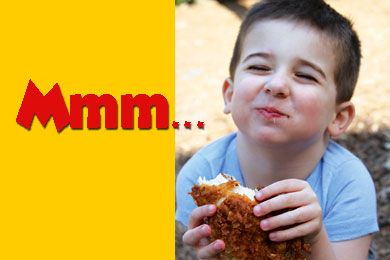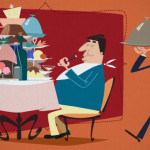A friend asks an interesting question: do you think restaurants would survive if people lost senses of taste and smell? Granted there are some people who do sunder this appalling fate and go on eating to live, though you don’t need to lose those critical senses to lack an interest in what you put in your body.
However, a good starting point is to remember that we still need nourishment, regardless of where we get it. I am reminded of an acquaintance to whom food was merely a refuelling stop; he did not particularly care what he ate and seemed happy to get it over and done with so he could get on with other activities. Sure, he recognised the social value of eating out for family time, but the process of eating and the gave him no identifiable pleasure. For me using my senses to appreciate food (ingredients, flavour, smell, texture, presentation etc) is critically important, though it seems that I’m not necessarily typical.
Traditionally, the eating habits of the richer end of civilisation have been governed more by habit and advertising than anything else, plus the lure of comfort food as stress relief – as much for the comforting feeling of biting, chewing and swallowing as the need for sustenance, let alone enjoyment of flavours. Surely this is a massively contributory factor to the obesity epidemic our public health gurus like to warn us about? Unlike my acquaintance most people go out to restaurants or supermarkets looking for new ideas and flavours to titivate their senses, so we shouldn’t underestimate the importance of senses when it comes to food.
Which senses are the most important? There is a restaurant in London called Dans Le Noir where sight is removed (see here), and one in New York called Eat where you eat in silence. The second may allow you better to enjoy your food without disturbance, removing in the process the social aspect of dining, but for most diners the loss of sight will be much the scarier – especially since the choice of menu food and drink is also restricted to general categories so you never know what Meale are coming next. I can imagine many people running a mile rather than having food inflicted by surprise.
The impact of the sense of sight on appreciation of food is discussed here and here, but the key question is whether being denied one sense heightens the remaining senses. If taste and smell (the latter represents up to 95% of what we think of as “flavour”, discussed here) are denied, does this mean we eat with our eyes? Pictures of beautifully presented food may make us salivate, but is that enough to compensate for the loss of flavour? If not, would that make us less willing to pay good money to experience being in a good restaurant, one selling food that should appeal to all our senses?
Consider this: when we are young we are more sensitive to strong flavours, which is why the young (along with the very old, for whom disorders of the digestive tract are common) are typically given blander foods – and why they develop more faddy dislikes along the way. The conventional wisdom is that you acquire a mature and sophisticated palate through experience and learning, but it might equally be said that the older we get the more our taste and smell are gradually dulled, such that we cope more easily with flavours that at one time might have been too strong or foreign to our palates.
This being the case, a significant minority of the population that taste and smell very little, yet these are the very citizens most likely to dine out, by virtue of high disposable income. Many will not be aware of the creeping decline in their senses, but that does not put them off. Remarkably enough, the restaurant trade has not suffered from the gradual decline among its clientele.
Why would this be? Disregarding my foodie sentiments for a moment, surely a major component of why people go to restaurants has little to do with the food and everything to do with the theatrical element – being seen out, being pampered and fawned over by waiters. Not everyone agrees with that notion, taking this comment on a thread I posted on this theme on Facebook as an example:
I have a love/hate relationship with food anyway so without being able to taste or smell I wouldn’t pay restaurant prices I would find other ways of being pampered and looked after.
Fair enough – you pays your money and you takes your choice, though many like to push the boat out occasionally as an alternative to takeaways. But even the cheapest eatery takes away the chore element of food since someone else cooks, serves and clears up after you, but there’s no doubt we love the service element, providing it doesn’t pander too strongly to ostentation and snobbery. So don’t underestimate service: it has been said that if a restaurant screws up the food, there are second chances, but there are no second chances when you screw up the service.
In spite of the FB comment above, there is more choice of restaurant in 2016 than ever before, wherever you live. While many restaurants open and close within their first year of operation, more are ready to take their place. Despite what you may think, more of us are eating out than ever before – and this study suggests Londoners eat out 3.7 times a week. Clearly disposable income is being spent on getting service, but the article suggests reasons why:
Tim Zagat, co-founder of the Zagat restaurant guides, said London was going through an eating out revolution over recent years with far more informal cheaper options appealing to younger diners springing up in areas such as Soho, Shoreditch, Brixton and Bethnal Green. He said: “There are more younger people looking for good food but not in in places with fancy decor and linen tablecloths. Eating out has become almost like eating in another room in a house, people are looking for a good meal but not looking to dress up.”
The subtext of this comment suggests people eat out because they lack the time and/or can’t be bothered to cook. The lack of education in cooking has certainly contributed, and if our parents get convenience meals from Tesco, we are more likely to do the same. But if dining out cheaply and easily is an option to us, we will take the path of least resistance when we get home late from work – all the more so when those options include a range of dining styles and ethnicity not previously encountered, thus exciting our jaded tastebuds.
Ah, but if eating food were like eating cardboard, would we be prepared to pay good money for it? Logic suggests we might revert to eating the cheapest dinners since they are no tastier than the most expensive. Either that or what is regarded as “health food,” since many of these already taste like cardboard anyway!
Since no such disaster will strike, I suggest we take good care of our olfactory organs and tastebuds, and use them to good effect. Eating badly by choice is a mug’s game!







